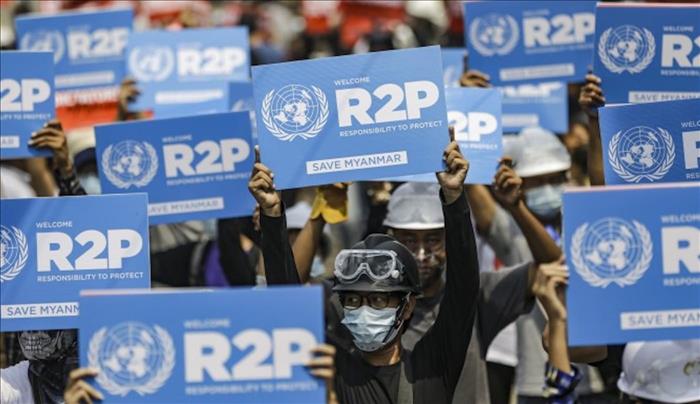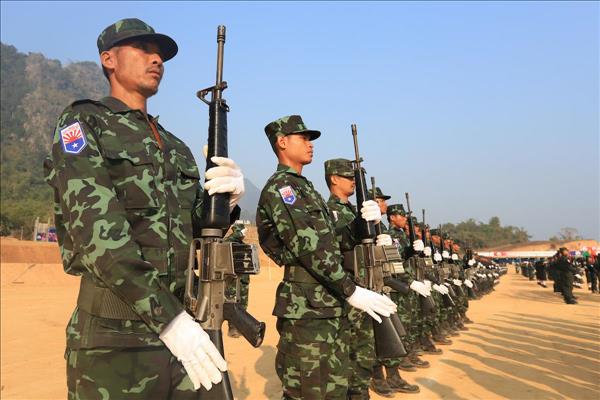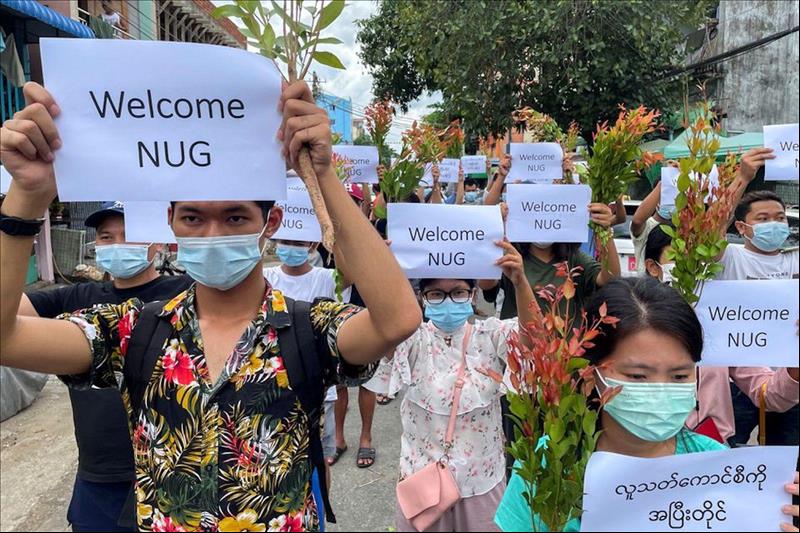
India will be frontline state in Myanmar's civil war
(MENAFN- Asia Times) How some animals sense when earthquakes are imminent remains a mystery. Ahead of the great Asian tsunami on December 26, 2004, elephants in Sri Lanka moved to high ground just before the giant waves struck; at Galle, southwest of Colombo, dogs refused to take a morning walk on the beach with their masters.
Conceivably, the decision by Adani Ports and Special Economic Zone Ltd to abandon its highly lucrative container-terminal project in Myanmar and write down the investment falls into the same league. For corporate houses are also known to possess animal instincts – they pick up subtle sounds or vibrations in the earth and anticipate impending disasters.
Their unusual animal behavior anticipates any sudden surge of time and causation in politics. The Adani group's 'animal behavior' comes in the backdrop of an incremental shift in the Indian government's attitude toward Myanmar – a gravitation toward the Western camp in its quintessentially anti-China 'Quad' project.
Diehard neocons and delusional left-wingers aside, it was apparent to outsiders right from the outset that the turmoil in Myanmar had all the hallmarks of a 'color revolution.' The cacophony rose to a high pitch by the end of March, culminating in the massacre of hundreds of protesters in a military crackdown.
That was a turning point. The chorus – British Broadcasting Corporation, Radio Free Asia, Western non-governmental organizations promoting democracy and human rights – soon began receding and the locus shifted from the streets to the world capitals with a massive diplomatic campaign for international intervention. A UN Security Council endorsement of intervention would have been ideal.

Myanmar protesters call for a UN intervention in the country's coup-caused crisis. Image: AFP
India tried to get Russia and China to agree to an intrusive approach, but a consensus was elusive. The memories of Western intervention in Afghanistan, Iraq and Libya haunt Moscow and Beijing. Besides, it would set a precedent for Belarus or Hong Kong, for example. The geopolitical dimension began surging.
But the operative part hidden from view concentrated on the creation of a 'government-in-exile' (a National Unity Government). Alongside, Britain's Secret Intelligence Service (MI6) sought to bring together Myanmar's main ethnic separatist guerrilla groups, encouraging them to take advantage of the chaos to open a second front.
Indeed, some degree of proximity has since developed between the Burman protesters in Yangon and Mandalay on one side and the non-Burman minority ethnic groups on the other. Despite a history of mutual antipathy, they now have a convergence to bleed the military. It is an improbable coalition of Buddhists and Christians, but as Susan Hayward of Harvard Law School cautiously assesses , it is doable:
'Today, the collective celebration of Christian, Muslim, and other non-Buddhist religious expression and participation in the movement itself hopefully foreshadows a more inclusive sense of nationalism.
'If nurtured and institutionalized by the appointed National Unity Government, this inclusive national identity could contribute to a democratic state where diversity is honored and celebrated, and those of non-Buddhist faiths do not face the same degree of institutional and social discrimination they have in the past.
'This will require significant, likely generational, transformation of state, religious, and cultural institutions and processes that have historically privileged Bamar Buddhists.'
At any rate, by mid-April, the first major armed attack on the military was carried out by the Karen National Union, Myanmar's oldest rebel group (which was originally created by the British colonial power as its proxy). Such attacks have since become commonplace .

KNU soldiers taking part in a parade for the 70th anniversary of the Karen revolution at a remote base on the Thai-Myanmar border, as ten of Myanmar's major rebel groups including the KNU threw their support behind the country's anti-coup movement. Photo: Handout / KNU / AFP
This week, the so-called National Unity Government announced its intention to establish a Federal Union Army, a military force of defectors from the security forces, rebel ethnic groups and volunteers. This would be a watershed transforming the anti-military agitation to an armed confrontation with the military.
Myanmar is entering the crucial stage where Syria stood in 2011.
The parallels with Syria are striking – 'Arab Spring' protests (March-July 2011) being crushed by the Syrian government, which was seized as an alibi for large-scale Western intervention by the US and its allies that eventually got hijacked by extremist groups, especially Islamic State and al-Qaeda, and triggered in turn Russian intervention in defense of President Bashar al-Assad's government.
Of course, one cardinal difference is that the neighboring countries do not want to get involved in a civil war in Myanmar. To be sure, in such a scenario, any shift in Indian policy toward bandwagoning with the Western project is fraught with serious consequences.
The startling news this week from Hakha , the capital of Chin State, close to the border with India, rings a warning bell for the northeastern states of India, which have ethnic and religious affinity with the rebel groups across the border. Chin State has been noted for stability and peace, but this week's incidents in the nature of 'hit-and-run' attacks resulted in the deaths of nine soldiers. This looks like a dress rehearsal.
More than 85% of the population in Chin State consists of Christians (numbering more than half a million). Chin shares a border with six districts of the Indian state of Mizoram. More than 87% of the Mizoram population are Christian, and there have been reports of people from Myanmar crossing over.
Most refugees coming in from Chin are from the Lai, Tedim-Zomi, Luse, Hualngo and Natu tribes, which share close links with the Mizos of Mizoram, as well as the Kuki-Zomis of Manipur.
Over the decades, many residents of Chin State have migrated to Mizoram too. India and Myanmar share an unfenced border of 1,643 kilometers passing through Arunachal Pradesh (520km), Nagaland (215km), Manipur (398km), and Mizoram (510km). The corresponding states in Myanmar include Kachin, Sagaing and Chin.

A map depicting where northeast India meets Myanmar. Image: Facebook
The situation is almost identical to the open Pakistan-Afghanistan border region. Like the Pashtun tribes straddling the Afghan-Pakistani border, Indian tribes such as the Mizos, Kukis, Nagas and Zombies also are split into smaller tribes sharing close ties across the border. If Myanmar becomes a failed state, India will have fallouts.
The tangled mountains and tropical jungles also make this classic guerrilla country. In the event of a civil war in the coming months and a rupture of Myanmar's unity, India will get sucked into the chaos.
Thailand and India are the only two plausible sanctuaries for MI6 and the US Central Intelligence Agency to navigate civil-war conditions in Myanmar – and Thailand enjoys friendly relations with China.
US Secretary of State Antony Blinken spoke with his Indian counterpart Subrahmanyam Jaishankar no fewer than three times in as many months since the military takeover in Myanmar. To be sure, India's cooperation is crucial for the success of the Anglo-American enterprise in Myanmar.
Myanmar figured prominently at the Group of Seven foreign ministers' meeting in London on May 3-5. Jaishankar traveled to London and met with Blinken. Neither side divulged details, but a Deutsche-Welle report flagged that 'China was at the top of the agenda as the G7 foreign ministers discussed a range of human-rights issues. Addressing the Myanmar coup and Russian aggression was also on the docket.'
It added that the G7 ministers watched a video from Myanmar's National Unity Government to 'update the ministers with the current situation on the ground.'

Protesters hold signs in favor of the newly established National Unity Government in Myanmar. Image: Agencies
The joint communiqué issued after the London meeting devotes much attention to Myanmar (paragraphs 21-24). It expresses 'solidarity' with the National Unity Government and issues a call for comprehensive sanctions against the Myanmar military, including an arms embargo.
The birth pangs of insurgencies are never open to public view as intelligence agencies get the actors into play. The Myanmar situation has reached that point. This is the first big bash of post-Brexit UK ('Global Britain') on the world stage. As so often in modern history, London will lead from the rear.
The Adani group's decision to wind up business in Myanmar is well timed. The influential corporate house probably had an animal instinct of the outcome of the G7 meet in London.
This article was produced in partnership by Indian Punchline and Globetrotter , which provided it to Asia Times.
M K Bhadrakumar is a former Indian diplomat.

Legal Disclaimer:
MENAFN provides the
information “as is” without warranty of any kind. We do not accept
any responsibility or liability for the accuracy, content, images,
videos, licenses, completeness, legality, or reliability of the information
contained in this article. If you have any complaints or copyright
issues related to this article, kindly contact the provider above.

















Comments
No comment